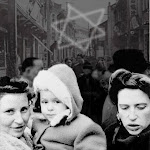
Many stories have surfaced regarding Holocaust experiences, full of struggle, loss and survival. I did, however, realize that my own family’s story was not at all widely known. Most people whom I had encountered were completely unaware that about 20,000 Jewish refugees had fled from the Nazi demons in Europe, escaped from the terrors and pending death in concentration camps and gas chambers, and found a bizarre hiding place in Shanghai, China. My family was among them. When my mother reached the milestone of eighty years, I decided that it was time that her unique and compelling life story should be recorded. It was up to me to fulfill that legacy.
When I started to put the words on paper, or actually on the computer screen, I realized that her biography, tied together with my father’s experiences and other close family members, was a tale that had more significance than I had originally imagined. As the poignant and powerful images unfolded through my writing, I felt that the world at large should know about their lives. I was determined that the book should be professionally published.
The writing, including intensive research, was a long and mostly solitary endeavour that took six years. The book materialized page by page, image by image until I felt confident that the story was told to the best of my capability and as engrossing as possible. It was an emotional roller-coaster for me as I sifted the young days of my family while flipping through albums of sepia photos. My father had already passed away before I began to write and it was, to a great extent, memories of him, his words and insights that spun in my mind and presented me with a muse. His life and my mother’s were separate threads that eventually intertwined into a stronger rope that would keep them together throughout many tribulations. With smiles and tears I was able to recapture the tumultuous episodes that I had heard about in my childhood and upbringing. As the story developed, I "met" my grandparents who had died before I was born, and learned more about the personalities of all my family members than I had expected.
.jpg)
.jpg)
No comments:
Post a Comment